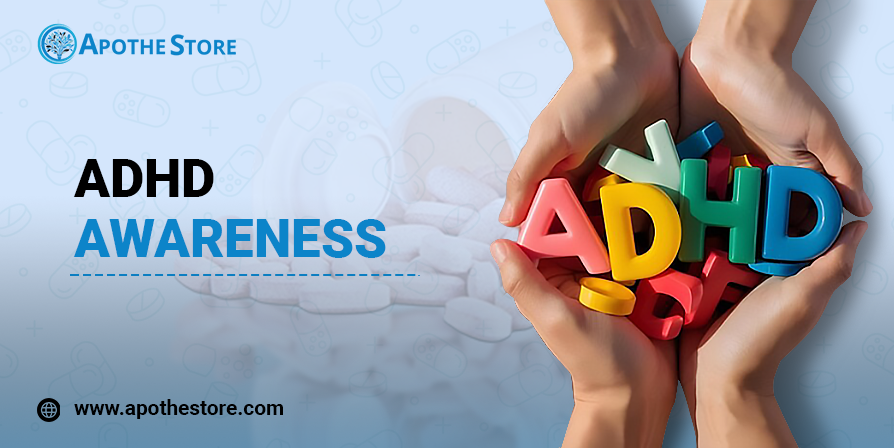Attention Deficit Hyperactivity Disorder (ADHD) is a common neurodevelopmental disorder that affects both children and adults. Despite its prevalence, ADHD Awareness is often misunderstood, leading to numerous myths and misconceptions. In this blog, we’ll debunk some of the most common myths, present the facts, and guide where to find support for those affected by ADHD.
Understanding ADHD
What is ADHD?
ADHD is characterized by a persistent pattern of inattention, hyperactivity, and impulsivity that interferes with functioning or development. Symptoms typically present in childhood and can continue into adulthood, impacting various aspects of life, including academic performance, work, and relationships.
Prevalence and Diagnosis
ADHD is one of the most common mental health disorders diagnosed in children, affecting about 5-10% of the population. While it is often diagnosed in childhood, many adults continue to live with ADHD, sometimes without realizing it. Diagnosis typically involves a comprehensive evaluation, including clinical interviews, behavioral assessments, and sometimes neuropsychological testing.
Common Myths About ADHD
1: ADHD is Not a Real Disorder
One of the most pervasive myths is that ADHD is not a real medical condition. However, ADHD is recognized as a legitimate disorder by major medical, psychological, and educational organizations, including the American Psychiatric Association and the World Health Organization.
2: ADHD Only Affects Children
While ADHD is commonly diagnosed in children, it does not disappear in adulthood. Many adults continue to experience symptoms, which can affect their personal and professional lives. Recognizing and addressing ADHD in adults is crucial for effective management and support.
3: ADHD is Caused by Poor Parenting
ADHD is a neurodevelopmental disorder with strong genetic and biological components. It is not caused by parenting style or discipline. However, a supportive and structured environment can help manage symptoms.
4: People with ADHD are Just Lazy
People with ADHD often face significant challenges with focus, organization, and time management. These difficulties are not due to laziness but are symptoms of a neurodevelopmental disorder. Understanding and compassion are essential in supporting individuals with ADHD.
Facts About ADHD
1: ADHD Has a Strong Genetic Component
Research shows that ADHD tends to run in families, indicating a strong genetic link. If a parent has ADHD, their child has a higher likelihood of developing the disorder.
2: ADHD Affects Brain Function
Studies using neuroimaging techniques have shown differences in brain structure and activity in individuals with ADHD. These differences can affect attention, impulse control, and executive function.
3: ADHD Can Be Effectively Managed
While there is no cure for ADHD, it can be effectively managed with a combination of medication, behavioral therapy, and lifestyle changes. Early diagnosis and intervention are key to successful management.
4: ADHD Affects Both Genders
ADHD affects both boys and girls, though it is often diagnosed more frequently in boys. Girls with ADHD may exhibit different symptoms, such as inattentiveness without hyperactivity, leading to underdiagnosis.
Finding Support for ADHD
Professional Help
If you suspect that you or a loved one has ADHD, seeking professional help is the first step. A healthcare provider, such as a pediatrician, psychiatrist, or psychologist, can conduct a thorough evaluation and provide a diagnosis.
Medication and Therapy
Medications, such as stimulants and non-stimulants, can be prescribed to help manage symptoms. Behavioral therapy, including cognitive-behavioral therapy (CBT), can also be effective in teaching coping strategies and improving functioning.
Educational Support
For children with ADHD, individualized education plans (IEPs) or 504 plans can provide accommodations in the school setting. These might include extended time on tests, preferential seating, and additional support services.
ADHD Awareness
ADHD awareness involves debunking myths, understanding the facts, and offering support to those affected. It highlights ADHD’s genetic basis, the challenges it poses, and effective management strategies. Raising ADHD awareness fosters a compassionate and informed society, ensuring individuals with ADHD receive the understanding and resources they need to thrive.
Lifestyle and Self-Care
Healthy lifestyle choices can make a significant difference in managing ADHD symptoms. Regular exercise, a balanced diet, sufficient sleep, and mindfulness practices can all contribute to improved focus and overall well-being.
Conclusion
ADHD awareness is crucial for dispelling myths, understanding the facts, and providing effective support for those affected by the disorder. By increasing ADHD awareness, we can foster a more compassionate and informed society, ensuring that individuals with ADHD receive the understanding and resources they need to thrive. Whether through professional help, educational support, or lifestyle changes, there are numerous ways to manage ADHD and lead a fulfilling life.
Understanding the myths, acknowledging the facts, and knowing where to find support are essential steps in raising ADHD awareness. With continued research and advocacy, we can improve the lives of those living with ADHD and create a more supportive environment for all.

